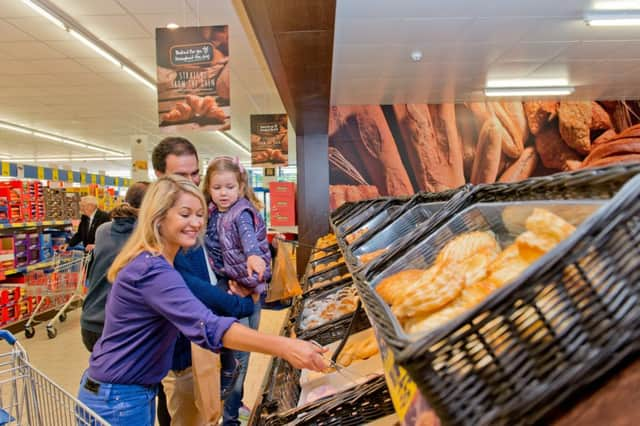Consumers benefit from supermarket pricing wars


With discounters such as Aldi and Lidl piling the pressure on major supermarkets, the British Retail Consortium (BRC) said food price inflation remained at 0.3 per cent last month – the lowest figure since its records began in December 2006.
Shop prices fell for the 16th month in a row in August, driven by a 10.2 per cent slide for clothing and footwear, although the overall decline of 1.6 per cent year-on-year marked a deceleration from the previous month’s 1.9 per cent fall.
Advertisement
Hide AdAdvertisement
Hide AdBRC director-general Helen Dickinson said consumers are expected to continue to feel the benefits of cut-throat competition, combined with the ongoing economic recovery and “subdued” increases in stores’ costs.
She added: “The summer months saw retailers provide plenty of attractive offers on fresh food goods which saw their lowest level of inflation this year, with vegetables, fish and also milk, cheese and eggs contributing to the downward pressure.”
Recent data from researcher Kantar Worldpanel showed that one in every two British households shopped at Aldi or Lidl at least once over the summer, helping the German chains hold onto their record market shares of 4.8 per cent and 3.6 per cent respectively for the 12 weeks to 17 August.
Supermarket giant Tesco, which last week stunned the market with a fresh profit warning, suffered the biggest drop in sales among the big four chains, with takings down 4 per cent compared with a year ago. Its market share has fallen to 28.8 per cent from 30.2 per cent over the same period.
Following the profit alert, which was accompanied by news of a looming 75 per cent cut to Tesco’s half-year dividend, former Unilever executive Dave Lewis took charge of the retailer on Monday, replacing former boss Phil Clarke a month ahead of schedule. Shore Capital analyst Clive Black said: “Tesco needs to improve, and soon, but the reality with such large organisations is that there is no quick fix to its trading problems.”
While today’s BRC report shows clothing and footwear experienced the most dramatic year-on-year fall in the non-food sector, prices for electrical goods were down 4.7 per cent. DIY, gardening and hardware dropped 2.3 per cent as stores tried to tempt purchasers of big-ticket items for the summer.
Falling prices for clothing, as well as alcohol, financial services and food, were last month highlighted by the Office for National Statistics for helping consumer price inflation slow more than expected to 1.6 per cent in July, down from 1.9 per cent the previous month.
Mike Watkins, head of retailer and business insight at researcher Nielsen, which collaborates with the BRC on its shop price index, said: “With trading still challenging, all retailers will be keen to keep prices as competitive as possible to encourage consumers back into store after the summer holidays.”